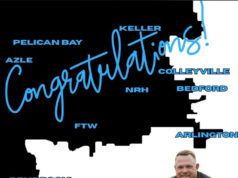Sports is in the diversity and inclusion business whether it likes it or not. If you read last week’s blog post about a big company trying to deal with racially charged issues, you might have that concept top of mind. If not, stay tuned, it’ll show up on your radar soon enough. As my guest for this week’s video interview pointed out to me, more athletes than ever have taken to using their platforms for advocacy.
Dr. Richard Lapchick has been using any and all platforms available to him to advocate for an inclusive sports world for most of his life. This week, the 74-year old had come to Dallas from Florida for a discussion event put on by two local groups active in the sports industry, the Black Sports Professionals – North Texas and the Dallas Influencers in Sports and Entertainment. Lapchick, Dallas Mavericks CEO Cynt Marshall, and Basketball Hall of Famer Nancy Lieberman discussed D&I issues on a panel moderated by the diversity chair for the Public Relations Society of America, Jennifer Cho.
For Lapchick, the gathering, which filled the Dallas Morning News’s auditorium, represented another chance to influence the sports world in a more diverse direction. It’s almost impossible to overstate the man’s influence in bringing such issues to the forefront. Lapchick led a boycott of apartheid-era South African sports teams. He directs The Institute for Diversity and Ethics in Sport. He established the Institute for Sport and Social Justice to use the resources of college athletics to bring about positive change. On the academic side, he serves as the chair of the DeVos Sport Business Management Program at the University of Central Florida, and you can bet those students get a healthy grounding in the ways sport can bridge divides.
The first question I asked in this interview sought his perspective in whether it made sense for two Caucasian men to discuss D&I issues in the first place. Luckily, he felt it was ok, or it would have been a really short video. It also got me to think about why this issue mattered to me. I give a lot of the credit to my father.
Ed Olson started the first modern women’s intercollegiate basketball program at a North Texas co-ed four-year university when he did so as athletic director at Texas Wesleyan College (as it was then known) in the early 1970s. He also put me into a National Youth Sports Program held at the college each summer where I experienced what it was like to be the one who didn’t look like everyone else.
Perhaps the most important thing I picked up from Dr. Olson was that everyone is an individual, with individual rights, like the ones enumerated in the U.S. Bill of Rights. I’ve also observed over the years that no two people I’ve met are alike. Qualities I admire, like integrity, intelligence, and the ability to drain a three-ball with a hand in one’s face don’t seem limited to one ethnic, gender, or other group. So that indicated to me that if you’re choosing to make judgements about someone based on their arbitrary membership in a club they can’t control, like ethnicity, you’re not going to get a very good reading on that person and you need to work a little harder, or probably a lot harder, to look past your biases.
Much of the discussion at Thursday’s event revolved around the sports workplace. It turns out the world (not just the sports world) is a diverse place whether one likes it or not. If one runs a business, or an aspect of one, and wants to grow one’s customer base, one will do much better if one understands the nature of those prospects as thoroughly as possible. And, quite often, who knows better how to help you sell widgets to emerging communities than members of those communities? Dr. Lapchick opined that one reason NBA Commissioner Adam Silver dealt successfully with 2014’s Donald Sterling debacle (in which the then-Clippers’ owner faced accusations of being a prejudiced adulterer) was because Silver had members of his executive team from affected groups who could properly advise him on how to respond.
So it turns out diversity, and the inclusive policies that allow a diverse workforce to feel comfortable, can help you win. And biases can make you lose. My father was half-responsible for my personal experience in this area because he and my mom supplied me with a sister who could hoop (all-conference in high school). I would take her with me to play pickup basketball at the YMCA with the guys. The opposing team, not imagining that a female could impact the game, would always put their worst defender on her. She would light his sorry butt up and we would win a lot.
Winning breaks down barriers. Dodgers fans could embrace Jackie Robinson as he led them to pennants. Kids of all persuasions bought Air Jordans as the shoes’ namesake led his franchise to six NBA titles. And a sales team gets pretty happy when they reach their quarterly goals no matter who brings in the transaction to put them over the top. Teamwork is a sports concept that extends far beyond playing surfaces.











